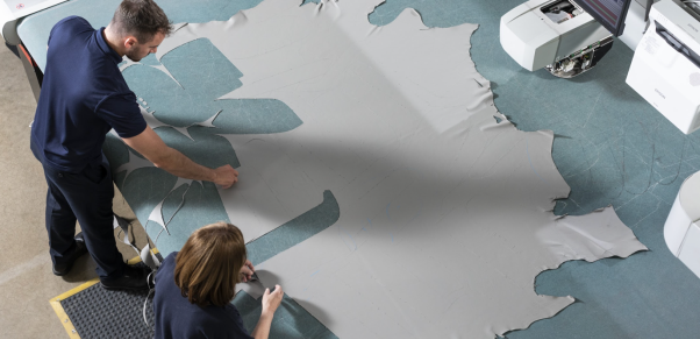Bridge of Weir Leather, expert supplier of Fine Automotive Leather to the world’s most respected luxury car brands, today becomes the first automotive leather manufacturer in the world to publish its independently-verified Life Cycle Analysis (LCA).
Building on more than two decades of responsible leather production leadership, Bridge of Weir has published its product’s LCA as part of the publication of parent company Scottish Leather Group’s 2022 Environmental Social and Governance (ESG) report.
Detailing progress towards its goal of zero impact leather manufacturing, the company commits to achieving net-zero by 2025 – twenty years ahead of Scotland’s net-zero ambitions – and also delivering zero waste to landfill by the same year, further fortifying its sustainability pledges.
Bridge of Weir Leather’s LCA, conducted by independent consultants, enables the business to measure the impact of its activities, verify its supply chains and identify opportunities to reduce its overall impact.
This long-term commitment to responsible and sustainable manufacturing has been driven by a series of significant, multi-million-pound investments implemented over the last twenty years, with forward-thinking initiatives such the patented Thermal Energy Plant (TEP) and Water Treatment & Recycling Plant (WTRP).
Bridge of Weir’s carbon footprint has been achieved without resorting to any carbon offsetting at all, while all data published is third-party accredited by BSI and independently verified according to ISO14016, Environmental Reporting Standard. In addition, the company’s unique lowest carbon leather directly supports its automotive customers and their journey to net zero carbon emissions across their entire supply chains.
Dr Warren Bowden, Head of Innovation and Sustainability at Scottish Leather Group, said: “As we continue to build on our industry-leading position by becoming the first automotive leather manufacturer in the world to publish an independently verified Life Cycle Analysis (LCA), we are demonstrating that leather is a naturally sustainable product and that it should be produced in a responsible manner too.
“We are fully committed to our long-term goals of achieving net-zero carbon emissions and zero waste to landfill by 2025. Our LCA is a powerful ‘carbon accounting’ tool for measuring how responsible our consumption of raw materials and our production of leather is, enabling a true and fair comparison against the impact of other products and materials. This rigorous measurement fully supports the strategic approach of the Scottish Leather Group and provides Bridge of Weir’s customers, the world’s most respected luxury automotive brands, with independently verified sustainability data.”
Jamie Davidson, Sales Director, Scottish Leather Group, concluded: “Bridge of Weir has been manufacturing the finest sustainable leather for the automotive industry for more than a century – and innovation is at the heart of what the business does.
“We are proud that our journey to zero, measured by rigorous analysis, leads the leather industry, and supports our valued customers, the world’s leading premium and luxury car makers, in achieving their own sustainability targets and meeting the demands of their consumers.”
Long-term commitment
Since 2003, Bridge of Weir has pioneered and patented circular manufacturing processes that minimise waste to landfill and radically reduce the carbon footprint, while its multi-million-pound Thermal Energy Plant [TEP] reclaims energy as steam and uses a proportion of this heat to directly power its tannery.
All the raw hides used in leather-making are a by-product of the local beef and dairy industries, of which over 98% are sourced locally within the UK and Ireland. The raw hides used to make Bridge of Weir leather are always sourced from responsible suppliers with 100% traceability and without risk of deforestation.
Bridge of Weir sources natural, clean, local water from its own loch – its Water Treatment & Recycling Plant (WTRP) plant enables the recycling of up to 40% of treated water back into use within production – while its world-class tannery uses 50% less water per hide than the industry standard.
Future commitment to further reduce emissions
Through its LCA, Bridge of Weir has identified a series of opportunities to further lower its impact in the future.
Dr Warren Bowden continued: “The current LCA uses generic farming data, not specific ‘primary’ data which is based on UK farming – widely recognised as being lower impact than the global data – so there is a potential for Bridge of Weir’s LCA to be even lower once this is factored in. Added to this, we are also working on a series of innovations, including biobased alternatives to existing tanning agents and novel tannages which pioneer new techniques.
“We are also developing solutions to solve the challenge of end-of-life leather, through energy conversion, or partnering with our customers, to repurpose their leather into new products.”

COMMENTS